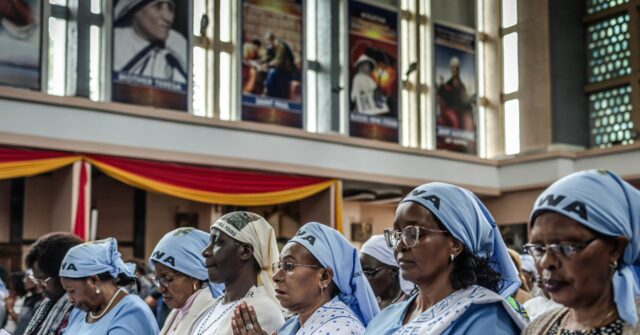The Vatican news agency Fides, in anticipation of the Catholic “World Mission Sunday” on October 19, published statistics on the world’s Catholic population revealing a boom in the number of faithful in Asia and Africa in particular.
“World Mission Sunday” is an annual occasion marked by the Holy See, and Catholic churches around the world, to honor its missionaries spreading the Gospel of Jesus, often at great personal risk. The Church typically holds this celebration during the last weekend of October.
Fides published data from the Church’s Book of Statistics, the latest edition of which was published in 2023. It documented nearly 16 million more Catholics around the world between 2022 and 2023, largely fueled by dramatic increases in the Catholic population in Asia and Africa. An estimated 1.4. billion people around the world identify as Catholic.
“As in previous years, increases were registered above all in Africa (+8.309.000) and in America (+5.668.000). Followed by Asia (+954.000), Europe (+740.000) and Oceania (+210.000),” Fides noted. “The world percentage of Catholics increased slightly (+0,1) compared to the previous year, reaching 17,8%. The Continents register slight variations.”
The numbers precede the changing of the guard at the Holy See this year following the passing of Pope Francis. The election of the first American pope, Pope Leo XIV, appeared to energize many of the faithful in the United States and in Peru, where he lived and served for decades. The current pontiff has emphasized focusing the platform of the Church on ending wars, particularly in Ukraine and Gaza. Shortly after the election of Pope Leo XIV, one of the most ancient European Catholic pilgrimages, the three-day march from Paris to Chartres in France, documented a record number of participants: 19,000 Catholics making the walk, carrying flags, banners, and icons of saints.
The Fides report noted elsewhere that, while the overall number of Catholics grew, the number of new priests declined almost everywhere on the planet – except in Africa and Asia, where the Church tallied “a significant increase” in the number. As of the report, Africa added 1,451 priests between 2022 and 2023, and Asia 1,145.
Africa and Asia were also the only continents where the report documented an increase in women joining religious orders. While, overall, the Church noted a 9,805-person decline in its population of women in religious orders, an extra 1,804 women joined orders in Africa, and 46 in Asia.
Asia and Africa becoming anchors of growth for the Catholic Church is of particular note given the formidable persecution that Christians of all denominations face on those continents. Religious persecution experts regularly identify countries such as North Korea, Nigeria, Yemen, Afghanistan, and Somalia as some of the most dangerous for followers of Jesus. In its annual “World Watch List” of persecution this year, Open Doors, a Christian aid organization, ranked North Korea, a communist cult dictatorship, the most dangerous place in the world to be a Christian. Its top ten most dangerous places, however, were all in Africa or Asia – five in each.
The sources of persecution around the world vary. In China and North Korea, for example, communist repression is the dominant force of repression. The only legal religion in North Korea is the worship of dictator Kim Jong-un and his family. Bibles are strictly outlawed and families caught possessing them or accused of praying to Jesus are banished into political prisoner camps, often for generations.
In China, Catholicism is one of five legal religions, but only the “Chinese Catholic Church,” an entity controlled by the Communist Party with no connection to the Vatican. Many Chinese Christians opt not to participate in the government-approved church, which preaches communism and worship of dictator Xi Jinping, and instead worship at home. “House churches” are illegal in China and Christians face significant punishment , including imprisonment, for organizing home services.
In Africa, the more prominent vehicle of oppression is Islamist persecution and jihadist slaughter – as it is elsewhere in Asia, such as Afghanistan and Pakistan. One particularly alarming example of persecution exists in Nigeria, a country whose population is nearly half Christian and boasts a secular government. In the nation’s Muslim-majority north, Christians face persecution by the local jihadist groups Boko Haram and the Islamic State West Africa Province (ISWAP). Boko Haram rebranded as ISWAP during the peak of the ISIS “caliphate,” which prompted a sector of that group to split and insist on retaining its Boko Haram identity. Both raid villages and engage in mass abductions of Christians.
In Nigeria’s Middle Belt – where the Christian-majority south meets the north – Fulani jihadist gangs rove across villages, engaging in genocidal attacks to destroy and replace Christian communities. The national government regularly refers to these jihadists as simple “bandits” and Christians in the region regularly complain that the government does little to protect their rights as the indigenous people of that land.
“These killings have been consistent. We have documented atrocities that have risen to the level of genocide against our people,” Father Remigius Ihyula, who ministers in central Benue state, told Breitbart News in an interview in 2023. “People, women and children, are killed on a daily basis. They are butchered, they have been driven from their homes, some have been living in camps for about ten years. They cannot go back to their homes.”
Follow Frances Martel on Facebook and Twitter.
Read the full article here


